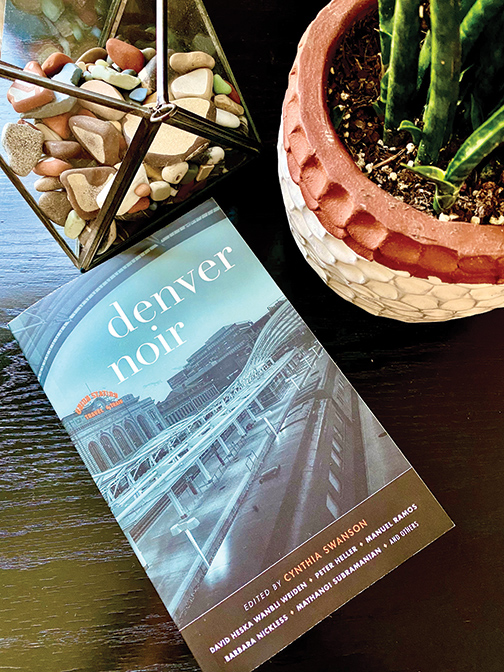DENVER NOIR: NEW ANTHOLOGY FEATURES MILE-HIGH STORIES BY CYNTHIA SWANSON, MATHANGI SUBRAMANIAN AND OTHER LOCAL AUTHORS
BY CYNTHIA SWANSON
In the fall of 2020, when Brooklyn-based publisher Akashic Books asked me if I’d like to curate and edit a Denver volume of their celebrated Noir series, I jumped at the chance. As a novelist who loves writing about Denver and gravitates toward stories with a level of moral ambiguity, this project was right up my alley. Akashic’s Noir series – over 100 titles and counting – is comprised of anthologies set in cities all over the country and the world. Every volume in the series features a local editor and about 14 stories, each set in a distinct neighborhood of the city.
A longtime resident of Wash Park myself, I nonetheless chose Cheesman Park as the setting for my own Denver Noir story, because I wanted to delve into the eerie, late-19th century history that transformed Cheesman from a paupers’ cemetery into the picturesque space we know today. Feeling somewhat guilty that I’d forsaken my own neighborhood in favor of Cheesman’s creepiness, I was gratified when award-winning author Mathangi Subramanian jumped on board to write a story set in Wash Park. I recently sat down with Mathangi to talk about her story, her connection to Wash Park, and the defining role of identity in fiction.
 Mathangi, you often write about young adults facing stressful life choices. Nithi is such a strong character who is wise beyond her years, yet as the reader, I felt an overwhelming desire to support her. What inspired your development of this character?
Mathangi, you often write about young adults facing stressful life choices. Nithi is such a strong character who is wise beyond her years, yet as the reader, I felt an overwhelming desire to support her. What inspired your development of this character?
When you generously asked me to contribute to Denver Noir, I knew I wanted to create a sympathetic wrongdoer. I’m always interested in characters that make us question what we believe and – in this case – what we would do if we were put in an untenable position. Specifically, this story gave me the opportunity to ask the question, how far will we go to protect the ones we love? As for Nithi’s identity, when it comes to characters, I tend to gravitate toward what I know. Although I have never been in the situation Nithi finds herself in, I have been a young, twenty-something South Asian woman trying to navigate a white world. This shared identity gave me a realistic window into the character, which gave me a strong foundation for imagining the parts of her life that I’ve never experienced.
Your description of Wash Park is accurate to a point that I could vividly imagine the scene on the bench. Did you have this neighborhood in mind originally for Denver Noir? Do you have personal ties to the park?
Thank you, this is such an incredible compliment! You asked me to contribute to this anthology in late 2020, mere months after I moved to Denver. The pandemic was still raging, and my family and I were very much confined to our neighborhood in east Wash Park, where we were renting. (We’ve since moved to Platt Park.) I was desperate to explore the city, but everything was shut down, so the best I could do was go for long walks in Washington Park. In addition to these solitary walks, whenever she got restless, my then 5-year-old and I spent hours wandering around our neighborhood – mostly because, at the time, it wasn’t clear if COVID could be transmitted through playground equipment, so it was really her only source of activity. Although I don’t have a long history with the neighborhood, I had an intensely immersive experience of the area while I was writing this piece, which I think is reflected in the specific details.
In less than 13 pages, you successfully grab the attention of the reader with an emotionally charged and intense story. I loved how you tied in the many nuances of race and what it’s like to grow up in Denver as a person of color. Was this a defining influence for your story?
I didn’t grow up in Denver, but I did grow up in predominantly white communities in the Midwest and on the east coast. Like many immigrants, it’s impossible for me to separate race from my stories, so much of my storytelling is based on my understanding of human nature, which, for me, is inseparable from race, gender, immigration status, and all of our multiple identities. I also just generally find identity interesting, so it often plays a defining role in my work.
Huge thanks to Mathangi and the other contributors to Denver Noir: Mario Acevedo, Francelia Belton, R. Alan Brooks, D.L. Cordero, Amy Drayer, Peter Heller, Twanna LaTrice Hill, Barbara Nickless, Manuel Ramos, Mark Stevens, David Heska Wanbli Weiden and Erika T. Wurth.
Denver Noir is available online, at local indie bookstores, and everywhere books are sold. We have numerous book release events lined up and would love to see you at any of them.
As I said in the book’s introduction, “Editing Denver Noir, working with this talented group of writers, has been one of the highlights of my career. Fans of noir and Denver devotees alike, I invite you into this journey of our Mile High City, our home beside the mountains, our capital of sunshine and darkness, optimism and anguish.”
Readers – enjoy the ride!
Cynthia Swanson writes literary suspense, often using historical settings. Cynthia is the author of the novels The Bookseller and The Glass Forest, and editor of the anthology Denver Noir. Find her online at http://cynthiaswansonauthor.com/.

